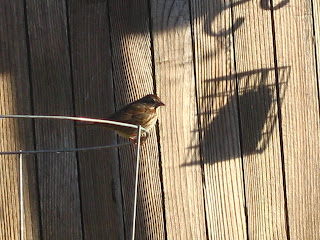 The End Which is also the Beginning
The End Which is also the BeginningSabbath begins in the evening with the lighting of the Sabbath candles and a blessing; the breaking of bread and the sharing of new wine. It closes the following evening in much the same way.
The end of Sabbath is marked by the appearance of the first three stars in the twilight sky. Once they appear, a triple wick, braided candle (three that are one) is lit, a cup of new or sweet wine is shared with blessings. There is also one other tradition. Instead of breaking bread together as was done to welcome Sabbath, at the closing ceremony, called Havdalaha, a tin of spices are opened and passed to each person. These spices are what Paul spoke of in
2 Corinthians 2:14-16.
But thanks be to God, who always leads us in His triumph in Christ, and manifests through us the sweet aroma of the knowledge of Him in every place. For we are a fragrance of Christ to God among those who are being saved and among those who are perishing; to the one an aroma from death to death, to the other an aroma from life to life. And who is adequate for these things? NAS
There is an odd little tradition associated with Havdalah. For some reason it is said that Havdalah is the time when the extra souls are released from the body. I do not know how or why this tradition started, but keep it in mind as you look at
Mark 1:32-34.
And when evening had come, after the sun had set, they began bringing to Him all who were ill and those who were demon-possessed. And the whole city had gathered at the door. And He healed many who were ill with various diseases, and cast out many demons; and He was not permitting the demons to speak, because they knew who He was. NAS
This passage begins in the evening after sun set. Sabbath had come to a close. The first three stars had been spotted, the candle lit, the wine and spice shared in the Jewish homes of Capernaum. Families went out for an evening stroll. But this night there seems to have been purpose and direction as people began to make their way to Simon-Peter's house where the Rabbi, the teacher from Nazareth was staying.
Just that morning in Synagogue, He spoke with an authority that they had never experienced before. Then He acted with authority, ordering an unclean spirit to silence and demanded the release of the person who had somehow become its host. No one had ever seen anything like that before. Suddenly the spice tin ritual seemed like a tease. They began to come to Him.
The whole city gathered at the door. In Hebrew the fourth letter,
dalet, pictures a door. The ancient pictograph
dalet of Moses is a closed tent door.
Dalet is symbolic of a needy person. In fact, the word
dalet is actually translated "poor" or "impoverished".
The person, the beggar who is poor in Spirit, standing at the door of the house, is conscious of their need and knows that within the house is the fulfillment of their need. There is more. As a door, the Hebrew letter
dalet symbolically represents the choice to open ourselves to hope or to remain closed off and alienated.
The whole city had gathered at the door. They brought the demon possessed. Needy souls who could not release that "extra" soul through the spice of Havdalah now come to the One who spoke with authority so that even the demons obeyed. He Himself was the Savor of Life.
There is something else. They also brought to Him all who were ill. Why did they do that? The passage seems to clearly distinguish between demonic activity in a host and biological illness. So why did they bring those who were ill, forcing them from their sick bed to the door of Simon-Peters house?
One possibility is that the word had spread about what Jesus had done for Simon's mother-in-law, as it had about the exorcism in the Synagogue, but I do not think that is what happened. She was healed quietly and privately in the house. Mark gives no evidence that word of her healing had spread. So why did they bring the sick to the house?
Before his arrest, John the Baptizer had a widely popular ministry calling people to get ready because the Messiah, the king of the Jews, time had come.
The last Old Testament prophet of Scripture, Malachi, said,
"But for you who fear my name the sun of righteousness will rise with healing in its wings; and you will go forth and skip about like calves from the stall
Malachi 4:2
With healing in (His) wings. Do you remember the Sunday School story of Jairus, whose daughter was dying? On the way to lay hands on her, Jesus had an encounter with a woman who had been subject to bleeding for twelve years. Remember how she thought to herself, "If I just touch the fringe of his garment I will get well" (Matthew 9:20). That is just what she did. That is what Jesus demanded that she confess. Once she did, He told her that her FAITH had made her well. What does that mean?
As I understand faith, it consists of believing the Word of God and acting on it. I think that the woman with the blood flow believed the same thing that the citizens of Capernaum did. They brought their sick by faith; but faith in what?
Every Torah observant Jewish man, like Jesus, weres a garment that (in English) we call a prayer shawl. The right and left edges of the prayer shawl are fringed. I have been taught that the fringed edges of the shawl are known as wings. Malachi prophesied that the Messiah would have "healing in his wings" The fringe of his prayer shawl. We know that the woman with the flow of blood believed this. Touching the fringe for healing was an act of faith. The Lord confirmed that it was faith when He assured her, "Your faith has made you well."
They gathered at the door. The word about the Rabbi from Nazareth had spread everywhere that Sabbath. A new teaching with authority! Even the demons obey Him. A needy people came to the door. He was the only one with the authority to set them free from unclean spirits. He had the power to heal those who came to Him.
And He healed many who were ill with various diseases, and cast out many demons. They came because of hope; they came because of belief that the Messiah of Israel could heal their sick. They came because of faith.
Blessed are the poor in Spirit... Matthew 5:3a
Blessed means "having the favor of God"
"the poor in Spirit" are those who are needy and recognize their need. They realize that they have no way to meet their own need, so they go begging in prayer to the only one who can meet their need.
For theirs is the kingdom of heaven.
"Behold, the tabernacle of God is among men, and he shall dwell among them, and they shall be His people, and God Himself shall be among them, and He shall wipe away every tear from their eyes; and there shall no longer be any death; there shall no longer be any mourning, or crying, or pain; the first things have passed away." And he who sits on the throne said, "Behold, I am making all things new." And He said, "Write, for those words are faithful and true."
Revelation 21:3b-5
Have you heard of the Messiah, the Christ? The one who loves you and took your sin on Himself, who is easily able to meet your need? Come to the door, let Him welcome you in.

 With the exception of waking up to snow on the 26th, the weather has been spring-like. But not many birds are flirting, not many are out and about in the morning. While buds on trees are just beginning to swell, there is still no sign of green on the trees. I am sure creation know better then I when the time is right to wake up to spring but from my perspective, it seems as if someone keeps slapping at the snooze button.
With the exception of waking up to snow on the 26th, the weather has been spring-like. But not many birds are flirting, not many are out and about in the morning. While buds on trees are just beginning to swell, there is still no sign of green on the trees. I am sure creation know better then I when the time is right to wake up to spring but from my perspective, it seems as if someone keeps slapping at the snooze button. 













 Leaving Anacortus The sunrise seemed stunning and we hoped it was a tell for the rest of the day. The sun was all peach and gold, coming through a hole in the clouds to check her reflection on the sea.
Leaving Anacortus The sunrise seemed stunning and we hoped it was a tell for the rest of the day. The sun was all peach and gold, coming through a hole in the clouds to check her reflection on the sea.






 There is a pond. Once you drive past Lime Kiln, head up the hill, wind around and look right. We love that pond. There is always something on the pond that I don't see in the sea. I have no idea what the name of the pond is.
There is a pond. Once you drive past Lime Kiln, head up the hill, wind around and look right. We love that pond. There is always something on the pond that I don't see in the sea. I have no idea what the name of the pond is.























